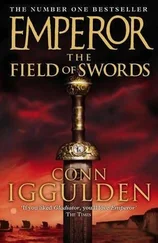The shield was ringed in bronze beading, but all eyes were fixed on the face and shoulders of the main figure of Marius, a life-size relief that glared out at those assembled. The whispering went on and on and then a cheer started in the crowd as they tried to show their approval for the dead general.
Antonidus spoke in fierce conversation with his advocate, and the man cleared his throat for the attention of the magistrates. The noise from the crowd was too much for the praetor, and he sent a flat hand signal to the centurion of the court guards. As one, the soldiers crashed the butts of their staffs into the paving and the crowd settled, wary of attack. Rufius stood forward, a bony vulture of a man dressed in a dark robe. He pointed with a sneer at the shield.
“Honorable Praetor. My client insists that this… item was not part of the house in dispute. It cannot qualify as the symbol unless it was part of the property.”
“I know the law, Rufius. Do not presume to lecture me,” the praetor replied stiffly. He turned his head to Julius. “Can you answer?”
“It is true that while Antonidus was in unlawful possession of the house of Marius, no such shield hung on the walls, but it was hanging this morning and will do as well as anything as the symbol of disputed ownership. I can produce witnesses to attest this,” Julius said smoothly.
The praetor nodded. “That will not be necessary, Caesar. I accept your point. The shield will be used.”
He frowned as a fresh cheer came from the crowd around them, and almost raised his hand for another signal to the guards. At this, the people fell silent, knowing better than to push his patience too far.
“Plaintiff and defendant, approach the symbol and complete the rite of dispute,” he said loudly.
Antonidus crossed the court floor, a slender spear held in his hand. Julius stepped up onto the platform with him, keeping his face blank of any triumph that would offend the magistrates. Julius touched his spear to the shield with a tiny ring of metal, then stood back. Antonidus brought his own point down and his mouth tightened as someone in the crowd jeered the act. Then he turned his back on Julius and walked back to his station by Rufius, who stood with his arms folded, relaxed and untroubled by the exchange.
“The property has been marked for dispute. The trial may now begin,” the praetor intoned, settling himself in his seat for comfort. His part of the proceedings was now over until the time came to dismiss the court. The three magistrates stood and bowed to him before one of them cleared his throat.
“As plaintiff, your advocate must speak first,” the magistrate said to Antonidus. Rufius bowed to him and took three steps out into the floor to better command the space.
“Praetor, Magistrates, Senators,” he began. “This is a simple case, though the penalties incurred involve the extremes of our law. Five weeks ago, the defendant brought armed men into the city for the purpose of violence. Such a crime is punishable by death or banishment. In addition, the defendant employed his men in breaking into a private house, that of the plaintiff, General Antonidus. The punishment for that is a mere whipping, but after death that may be seen as unnecessary cruelty.” He paused while a titter of laughter ran along the benches of the court. The crowd outside remained silent.
“Rough hands were laid on the servants and guards of the house, and when the owner returned, he was forbidden entry to his own home by the same soldiers.
“He is not a vengeful man, but the crimes against him are many and grave. As his advocate, I call on you to administer the sternest punishment. Death by the sword is the only possible answer to such a flouting of Rome's laws.”
A polite clapping came from the men around Cato, and Rufius nodded briefly to them as he resumed his seat, his bright eyes belying the air of relaxation he pretended.
“And now the defendant,” the magistrate continued. Nothing in his manner showed whether he had been moved by Rufius's words, but still Julius stepped forward with a hollow feeling in his stomach. He had known they could try for death, but hearing it in court made it a reality that shook his confidence.
“Praetor, Magistrates, Senators, people of Rome,” Julius said loudly enough to carry to the crowd. They cheered this, though the praetor frowned at him. Julius ordered his thoughts before continuing. Instinctively, he felt that the defense of Marius would appeal more to the people who had suffered under Sulla than to the silent judges, but playing to them was a dangerous course and could even sway the magistrates against a strong case. He would have to be careful.
“This case has a longer history than five weeks,” he began. “It begins on a night three years ago when the city prepared for civil war. Marius was the legally appointed consul of Rome, and his legion had fortified the city against attack-”
“Your honors, I appeal to you to have him cease this rambling discourse,” Rufius broke in, standing. “The question is the ownership of a house, not the struggles of history.”
The magistrates conferred for a moment, then one stood.
“Do not interrupt, Rufius. The defendant has a right to make his case as he thinks best,” he said. Rufius subsided and sat down.
“Thank you, your honor,” Julius continued. “That Marius was my uncle is well known. He took the defense of the city on himself when Sulla departed to Greece to defeat Mithridates, a task Sulla left rather incomplete.”
The crowd chuckled at this, then fell silent as the praetor swept them with his glare. Julius went on. “Marius was convinced that Sulla would return to the city with the aim of assuming complete power. To avert this, he fortified Rome's walls and prepared his men to defend the people of the city against armed attack. If Sulla had approached the walls without violence, he would have been allowed to resume his consular post and the peace of the city would have remained unbroken. Instead, he had left assassins within the bounds who attacked General Marius in the dark in a cowardly attempt at murder. Sulla's men opened the gates and let their master into the city. I believe it was the first armed attack on her in more than three hundred years.”
Julius paused for breath, looking at the magistrates to see how they were reacting to his words. They regarded him impassively, their expressions giving nothing away.
“My uncle was dispatched by a dagger from Sulla's own hand, and though his legion fought valiantly for days, they too fell to the invader.”
“This is too much!” Rufius cried, leaping up. “He blackens the name of a beloved leader of Rome under the protection of this trial. I must ask you to condemn him for his foolishness.”
The magistrate who had spoken before leaned forward and spoke to Julius. “You are pushing our patience, Caesar. If the case is found against you, be sure we will consider your disrespect when it comes to the sentence. Do you understand?”
Julius nodded, gulping to clear his suddenly dry throat. “I do, though the words must be spoken,” he said.
The magistrate shrugged. “It's your head,” he muttered as Julius took a calming breath before speaking again.
“Much of the rest you know already. As victor, Sulla claimed the title of Dictator. I will not speak of that period in the city history.”
The magistrate nodded sharply at this as Julius continued.
“Though he had defended the city under the law, Marius was declared traitor and his possessions sold off by the state. His house was auctioned publicly and bought by the plaintiff of this trial, General Antonidus. His legion was dispersed and their name struck from the honor rolls in the Senate.”
Julius paused and bowed his head as if in shame at the act. A murmur ran through the senators in attendance as they whispered questions and comments to each other. Then Julius raised his head again and his voice rang out over the judges and the crowd.
Читать дальше
Конец ознакомительного отрывка
Купить книгу












